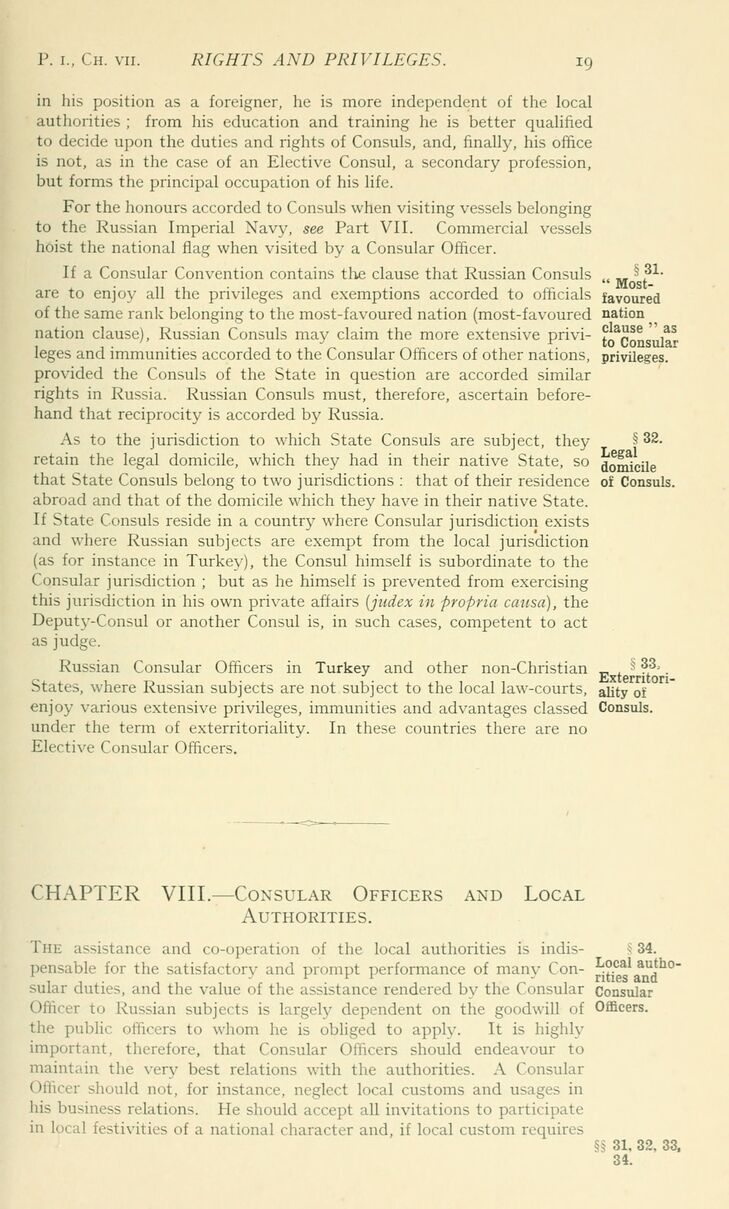
Full resolution (JPEG)
- On this page / på denna sida
- Pages ...

<< prev. page << föreg. sida << >> nästa sida >> next page >>
Below is the raw OCR text
from the above scanned image.
Do you see an error? Proofread the page now!
Här nedan syns maskintolkade texten från faksimilbilden ovan.
Ser du något fel? Korrekturläs sidan nu!
This page has been proofread at least once.
(diff)
(history)
Denna sida har korrekturlästs minst en gång.
(skillnad)
(historik)
in his position as a foreigner, he is more independent of the local
authorities ; from his education and training he is better qualified
to decide upon the duties and rights of Consuls, and, finally, his office
is not, as in the case of an Elective Consul, a secondary profession,
but forms the principal occupation of his life.
For the honours accorded to Consuls when visiting vessels belonging
to the Russian Imperial Navy, see Part VII. Commercial vessels
hoist the national flag when visited by a Consular Officer.
§ 31. "Most-favoured nation clause" as to Consular privileges.
If a Consular Convention contains the clause that Russian Consuls
are to enjoy all the privileges and exemptions accorded to officials
of the same rank belonging to the most-favoured nation (most-favoured
nation clause), Russian Consuls may claim the more extensive
privileges and immunities accorded to the Consular Officers of other nations,
provided the Consuls of the State in question are accorded similar
rights in Russia. Russian Consuls must, therefore, ascertain
beforehand that reciprocity is accorded by Russia.
§ 32. Legal domicile of Consuls.
As to the jurisdiction to which State Consuls are subject, they
retain the legal domicile, which they had in their native State, so
that State Consuls belong to two jurisdictions : that of their residence
abroad and that of the domicile which they have in their native State.
If State Consuls reside in a country where Consular jurisdiction exists
and where Russian subjects are exempt from the local jurisdiction
(as for instance in Turkey), the Consul himself is subordinate to the
Consular jurisdiction ; but as he himself is prevented from exercising
this jurisdiction in his own private affairs (judex in propria causa), the
Deputy-Consul or another Consul is, in such cases, competent to act
as judge.
§ 33. Exterritoriality of Consuls.
Russian Consular Officers in Turkey and other non-Christian
States, where Russian subjects are not subject to the local law-courts,
enjoy various extensive privileges, immunities and advantages classed
under the term of exterritoriality. In these countries there are no
Elective Consular Officers.
| CHAPTER VIII. — Consular Officers and Local Authorities. |
§ 34. Local authorities and Consular Officers.
The assistance and co-operation of the local authorities is
indispensable for the satisfactory and prompt performance of many
Consular duties, and the value of the assistance rendered by the Consular
Officer to Russian subjects is largely dependent on the goodwill of
the public officers to whom he is obliged to apply. It is highly
important, therefore, that Consular Officers should endeavour to
maintain the very best relations with the authorities. A Consular
Officer should not, for instance, neglect local customs and usages in
his business relations. He should accept all invitations to participate
in local festivities of a national character and, if local custom requires
<< prev. page << föreg. sida << >> nästa sida >> next page >>
Project Runeberg, Sat Dec 9 18:48:28 2023
(aronsson)
(diff)
(history)
(download)
<< Previous
Next >>
https://runeberg.org/consular/0039.html




